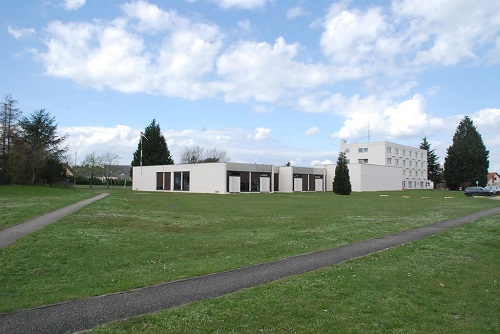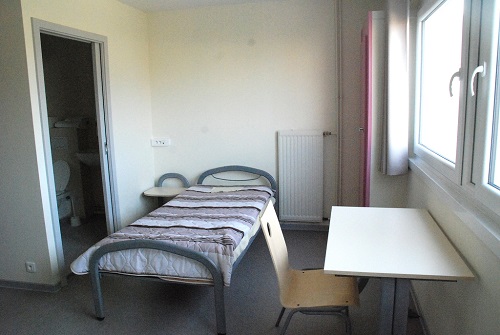
What is the Erasmus program?
The Erasmus program is an European exchange program, which allows students to complete part of their internship or studies in one of the member or partner countries of the program.
This period of mobility can concern both students and trainers.
Candidates who leave for an experience in another country than the home institute are called « outgoing candidates ».
Students welcomed by the institute and from another country are called « incoming candidates ».
The general objectives of this program are:
- To strengthen the knowledge and skills of students, especially their adaptability
- To develop the school-business relationship
- To foster excellence, innovation and internationalization of education and training institutions
- To support the internationalization of institutions
What does ERASMUS mean?
Erasmus means EuRopean Action Scheme for the Mobility of University Students. Erasmus was a Dutch theologian monk of the fifteenth century who considered travel as a trainer of greater humanism.
The acquisition of linguistic skills, the discovery of another culture, and a different organization of care encourage the personal development of students, and promote an open mind favoring it thereafter to enter a quality approach by the acquisition and sharing of knowledge and know-how.
To this end, the Haguenau IFSI has decided to subscribe to the current Erasmus Charter (2014-2020) in order to allow the students to enter in the Erasmus Program, and who meet the conditions of eligibility, to leave for another country starting from semester 5.
To learn more about the program:
The Erasmus project for nursing students
« The real voyage of discovery is not to look for new landscapes, but to have new eyes »
– Marcel PROUST
The opportunity for nursing students to complete a period of mobility in another country increases the level of qualification, given that it is necessary to master a foreign language, to learn new lessons, and to adapt to new care managements, in order to enter the program.
The cooperation that develops through this program should allow nursing students to develop their adaptation skills, to promote the sharing of experiences, to collaborate on innovative experiences. These experiences promote the integration of different values such as respect, trust, tolerance and openness.
Understanding other health and education systems and other related issues help to understand future developments in the health field.
Contact information of reference persons
Students who wish to participate in an ERASMUS exchange program for a period of study or for internship purposes are invited to contact Erasmus referees:
• Luc NIESS : luc.niess@ch-haguenau.fr
• Hervé UNTEREINER : herve.untereiner@ch-haguenau.fr
• Sandra EYER : sandra.eyer@ch-haguenau.fr
They can also contact the IFSI secretariat (03 88 06 30 81) or sec.ifsi@ch-haguenau.fr.
Interested persons may also contact the Haguenau Nursing Student Association (AESIH).
Contact: aesih-contact@gmail.com
What are the conditions for participating in an Erasmus project?
Criteria to apply for ERASMUS mobility:
It is necessary to be in semester 5 and to have validated the internships of semesters 1 to 4 as well as the academic evaluations of these semesters.
Students who wish to participate in a mobility period of the ERASMUS program must send a letter of intent during the semester 3 to the IFSI ERASMUS internal unit.
Successful students will have an assessment of their language level and will be accompanied in the semester prior to mobility to complete and / or improve their knowledge of the language from the OLS platform.
During the semester 4 the students selected based on their letter of intent will have to elaborate a project, a resume and a letter of motivation.
Students will be auditioned, and will present their project to the IFSI internal unit, which will decide on the validity of their project and their eligibility for a period of mobility.
Les cours par unités d'enseignement
L'équipe de l'IFSI : le trombinoscope et les CV
Administrative arrangements for outgoing candidates
Language Policy
All nursing students are taught in person and in English throughout their training. This teaching has three levels of requirements, which allow flexibility in learning.
This teaching gives rise to evaluations and equivalence of credits.
The teaching of English is done by speakers from an external training organization (GRETA). Supplementary material is provided through e-learning in order to complete the in-person courses.
The minimum level required will be set with the host institution to allow the follow-up of teaching or internship units established in the teaching contract. The Erasmus + cell will validate the student’s level of education or ability to progress.
Those eligible for mobility will take the language test offered by the Erasmus online language platform.
If this level is not reached following this first test, additional training in the form of intensive preparation will be considered to allow the student to reach the required level.
In addition, the participation to the « interculturality » module will be encouraged in order to prepare outgoing students for the cultural / linguistic differences of the host country.
The progression of the language level of the student will be evaluated by a test upon his return and will be recognized in terms of acquisitions of credits.
Student follow-up
- Educational follow-up:
The pedagogical supervisor of the student will be responsible for advising the student in his choice of modules or teaching in the host institutions. The same referent will sign the pedagogical contract.
- At the level of the internship :
The pedagogical coordinator will follow the internship of the student according to a pre-established schedule with the host institution and at a minimum weekly phone conference chat.
The pedagogical monitoring referent will have weekly meetings with the host institution and the student to answer questions and to ensure the acquisition and integration of skills.
On the return, the pedagogical monitoring referent will take stock on the acquired ECTS and on the accompaniment to validate the missing ECTS. They will integrate their period of mobility into the Diploma Supplement by recognizing the credits obtained.
- Administrative :
For outgoing students: they are assisted and informed for all departure procedures (identity papers, vaccination book, extension of professional liability and sickness insurance, portfolio translated into the language of the host country).
The documentalist prepares an information book about the country and the host city. A course on the sociological and anthropological approach of the host country is organized.
The pedagogical monitoring referent will have weekly meetings with the host institution and the student to answer questions and to ensure the acquisition of skills and integration. On the return, the pedagogical monitoring referent will take stock on the acquired ECTS and on the accompaniment to validate the missing ECTS.
Administrative arrangements for incoming candidates
Language Policy
For students and incoming staff, IFSI is committed to organizing a partnership with the Université Populaire to set up French-language support classes in the evening (5:30 pm to 7:00 pm).
Access to wifi will allow students and staff to also take online support courses offered by the Erasmus platform.
The referent of pedagogical follow-up will be a resource person who will follow the evolution of the student in the linguistic acquisition.
A sponsoring student will also be in charge of identifying the potential language difficulties of the host student in order to put help and support actions in place.
For incoming staff, the teaching team will provide support to the hosted trainer and, if necessary, connect them with a network of people speaking the language of origin to facilitate their linguistic integration and overcome any difficulties.
Student follow-up
- Pedagogic follow-up :
At the pedagogical level, a trainer mentor is assigned to the student. The trainer analyzes the study contract (list of courses to be followed, internship with ECTS awarded). After a pedagogical interview, the trainer validates the placement site and defines the learning objectives, the follow-up procedures and the schedule, with the student and the partner institute.
The trainer staff regularly monitors the student and validates with them, at the end of the mobility period, the documents attesting the validation of the corresponding ECTS.
The internship takes place within the Hospital Center of Haguenau. (Student supervision charter).
It transmits all follow-up documents to the home institution.
- Integration :
For incoming students: setting up a sponsorship facilitates the integration of incoming students. This system is operational in the context of exchanges with a German institute. A student of the same level of study is the sponsored student. The sponsor is assigned to the same training field with the same hours and will follow the same courses to help learning.
The pedagogical team and the « sponsors » organize a period of immersion to inform the incoming students on the teaching methods (planning, rating, recourse, visit of the places of training) and on the possibilities of leisures (visit of the city , help with the installation of the student).
- Housing :
In addition to your personal steps in finding accomodations, two options are available to you:- The Haguenau Hospital Center offers equipped studios (on the very site of the Hospital Center located at 3km). Contact the secretariat 03 88 06 30 81.
- Accommodations are available in the Residence Alter & Toit (located directly next to the IFSI)




